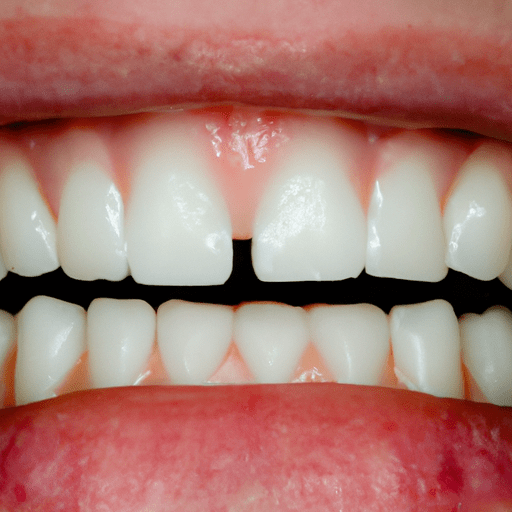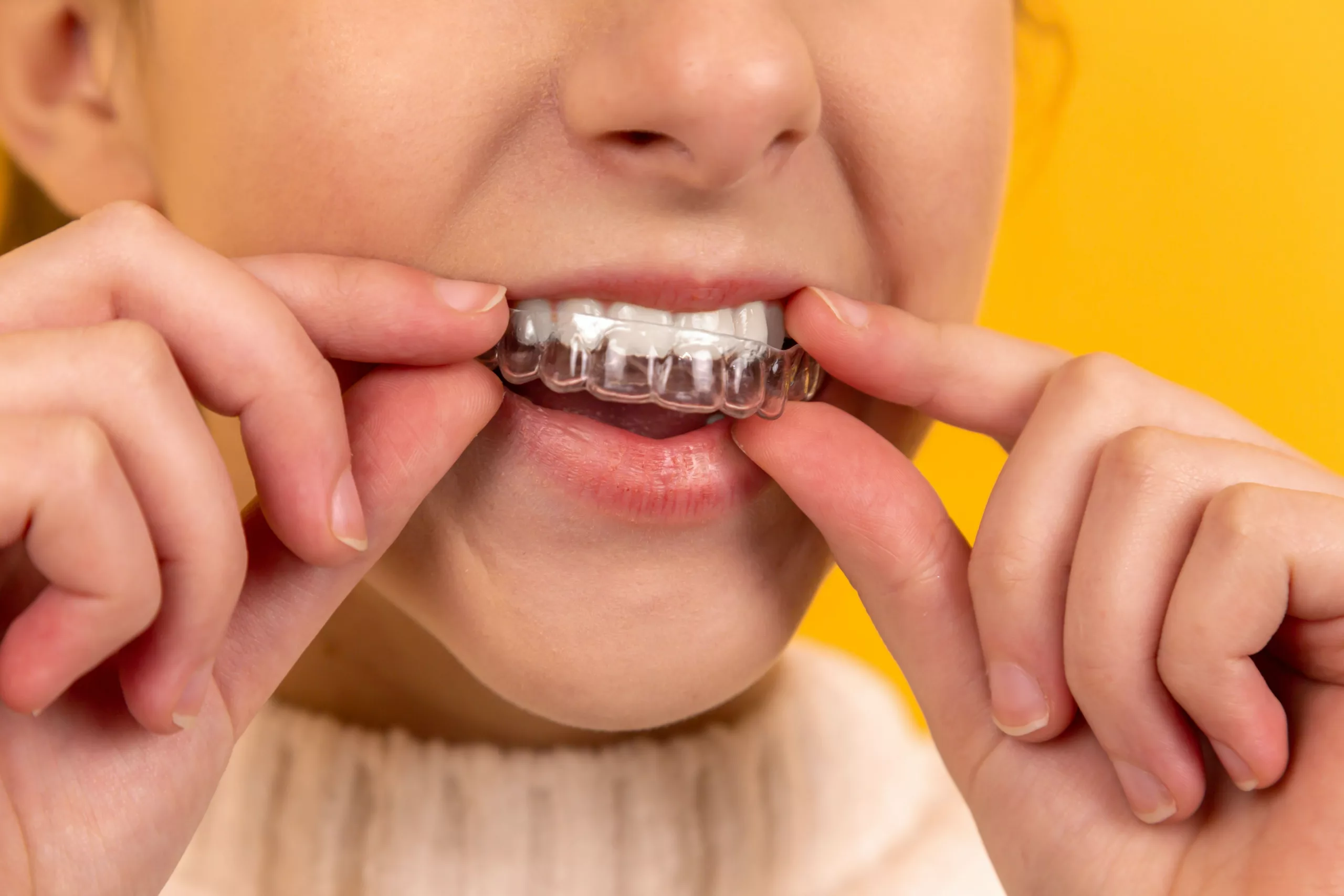If you’ve ever wondered why you or your partner snore, you may not have to look any further than your bite. Surprisingly, an overbite, a common dental issue, could be the culprit behind those restless nights. That’s right – the alignment of your teeth could be contributing to the vibrations and obstructions that create the all-too-familiar snoring sound. In this article, we’ll explore how an overbite can lead to snoring and discuss the potential solutions to help you get a peaceful night’s sleep. So, let’s discover how your bite could be affecting your snooze!

Understanding Overbite
An overbite is a dental condition characterized by the upper front teeth overlapping significantly with the lower front teeth. While a slight overbite is normal, an excessive overbite can lead to various issues, including snoring.
Definition of Overbite
An overbite refers to the vertical overlap of the upper front teeth over the lower front teeth when the jaws are closed. It is measured by the amount of vertical overlap between the two sets of teeth. A mild overbite is typically considered normal, but a severe overbite can result in functional and aesthetic concerns, including snoring.
Types of Overbites
There are two main types of overbites: dental and skeletal. A dental overbite occurs when the position of the teeth causes the overlap. It can be caused by various factors, including genetics, thumb-sucking, or prolonged pacifier use. On the other hand, a skeletal overbite happens when the upper jaw protrudes forward in relation to the lower jaw, leading to an exaggerated overlap of the teeth.
Common Causes of Overbite
Several factors contribute to the development of an overbite. One common cause is unsuitable oral habits during childhood, such as thumb-sucking or prolonged pacifier use. Genetics also play a significant role, as a family history of overbites increases the likelihood of developing one. Additionally, improper jaw alignment or tooth alignment can contribute to the development of an overbite.
Anatomy of a Healthy Bite
A healthy bite is characterized by proper alignment of the upper and lower teeth. The upper teeth should slightly overlap the lower teeth, allowing for efficient chewing and a harmonious occlusion. This alignment ensures that the forces exerted during biting and chewing are evenly distributed, minimizing the risk of dental issues such as premature tooth wear or jaw pain.
Characteristics of a Healthy Bite
In a healthy bite, the upper and lower teeth form a close fit when the jaw is closed. This alignment allows for the proper distribution of force during chewing, preventing excessive strain on specific teeth. The contact between the teeth should be even, meaning no individual tooth receives an excessive amount of pressure that may lead to damage or discomfort. Moreover, a healthy bite promotes proper jaw movement and helps maintain good oral hygiene.
Role of Teeth and Jaw in Breathing
The teeth and jaw play an important role in breathing. The position of the teeth determines the size and shape of the oral cavity, which impacts airway space. Proper alignment of the teeth and jaw allows for optimal airflow and reduces the likelihood of breathing difficulties during sleep. Conversely, an overbite can compromise the airway by narrowing the oral cavity, potentially leading to snoring and other breathing-related issues.
How Normal Bite Influences Sleep Patterns
A normal bite, with a proper alignment of the teeth and jaw, contributes to better sleep patterns. When the airway is unobstructed due to a well-aligned bite, breathing is not compromised, allowing for uninterrupted and restful sleep. On the other hand, an overbite can obstruct the airway and disrupt normal breathing during sleep, resulting in snoring and potentially affecting the quality of sleep.
Understanding Snoring
Snoring is a common sleep-related issue characterized by the production of loud or harsh sounds during sleep. It occurs when the flow of air through the mouth and nose is partially blocked, leading to vibrations in the soft tissues of the upper airway. Snoring can have various causes, including anatomical factors, lifestyle choices, and underlying medical conditions.
Definition and Causes of Snoring
Snoring is the noisy breathing sound that occurs when the airflow is obstructed during sleep. It can be caused by multiple factors, such as relaxed throat muscles, excess weight, nasal congestion, or the position of the tongue and soft tissues in the mouth. An overbite can also contribute to snoring by narrowing the airway and impeding the smooth flow of air during sleep.
How Snoring Affects Sleep
Snoring can significantly impact sleep quality, both for the snorer and their partner. The loud snoring sounds can disrupt sleep cycles, leading to fragmented and shallow sleep. This can result in excessive daytime sleepiness, fatigue, and overall reduced cognitive function. Snoring may also disrupt the sleep of others nearby, causing strain in interpersonal relationships.
Health Risks Linked to Snoring
While snoring may seem harmless, it can be a sign of underlying health risks. Persistent snoring can be an indication of sleep apnea, a serious sleep disorder characterized by repeated pauses in breathing during sleep. Untreated sleep apnea is associated with an increased risk of high blood pressure, heart disease, stroke, and other cardiovascular issues. It can also contribute to the development of mental health issues, such as depression and anxiety.
The Link Between Overbite and Snoring
An overbite can play a significant role in the development or exacerbation of snoring. The misalignment of the teeth and jaw associated with an overbite can lead to a narrower airway, making it more likely for the soft tissues in the throat to vibrate during sleep, resulting in snoring. The overlapping of the teeth in an overbite can further contribute to the blockage of the airway, amplifying the intensity of snoring.
Why Overbite Leads to Breathing Problems in Sleep
The presence of an overbite alters the natural alignment of the teeth and jaw, affecting the structure and size of the oral cavity. This altered anatomy can cause a narrowing of the airway during sleep, making it more difficult for air to flow freely. As a result, the soft tissues in the throat are more likely to vibrate, leading to snoring and potentially impeding effective breathing patterns during sleep.

Scientific Studies Supporting This Theory
Various scientific studies have shed light on the link between overbite and snoring. Research has shown that individuals with overbites are more likely to experience snoring and other sleep-related breathing issues. These studies have used imaging techniques, such as CT scans and airway measurements, to demonstrate the association between dental occlusion, airway morphology, and the risk of snoring.
Symptoms Indicating Overbite-Related Snoring
Recognizing the presence of an overbite and its potential association with snoring can be crucial in seeking appropriate treatment. Common symptoms indicating overbite-related snoring include difficulty breathing through the nose, excessive daytime sleepiness, frequent waking during the night, chronic mouth breathing, and loud, disruptive snoring sounds during sleep.
Signs of Snoring Due to Overbite
The signs of snoring due to an overbite can manifest both during sleep and while awake. During sleep, loud snoring sounds accompanied by pauses in breathing or gasping for air are common indications of an overbite-related snoring issue. Other signs during wakefulness may include chronic dry mouth, morning headaches, and a sore throat upon waking.
How to Determine if Your Snoring is Caused by an Overbite
If you suspect that your snoring may be caused by an overbite, it is essential to consult with a dental professional or a sleep specialist. They will evaluate your dental occlusion by examining the position and alignment of your teeth and jaw. Diagnostic tests, such as dental impressions, X-rays, and sleep studies, may be conducted to determine the underlying causes of your snoring and whether an overbite is contributing to the issue.
Impact of Overbite-Induced Snoring on Sleep Quality
Snoring associated with an overbite can have a significant impact on sleep quality. The loud snoring sounds can disrupt the normal progression of sleep stages, leading to fragmented sleep patterns and reduced overall sleep quality. This can result in excessive daytime sleepiness, decreased cognitive function, mood disturbances, and an increased risk of accidents or injuries due to impaired alertness.
Dangers of Insufficient Sleep
Insufficient sleep resulting from overbite-induced snoring can have numerous detrimental effects on physical and mental health. Chronic sleep deprivation can lead to increased risk of obesity, diabetes, cardiovascular diseases, and weakened immune function. It can also contribute to mental health disorders, such as depression, anxiety, and impaired cognitive function, affecting overall well-being and quality of life.
Potential Long-Term Effects on Physical and Mental Health
Long-term snoring related to an overbite can have lasting consequences on physical and mental health. The strain on the cardiovascular system due to compromised oxygen intake during sleep can increase the risk of heart disease, high blood pressure, and stroke. Moreover, the chronic sleep disruption and oxygen deprivation can impact cognitive function, mood regulation, and mental health, potentially leading to long-term issues if left unaddressed.

Other Health Complications Associated with Overbite and Snoring
Snoring due to an overbite can be indicative of underlying conditions such as sleep apnea, a potentially severe sleep disorder. Sleep apnea is characterized by recurrent pauses in breathing during sleep, leading to oxygen deprivation and subsequent health complications. Individuals with overbites and snoring also have an increased risk of developing heart diseases, including hypertension and arrhythmias. Furthermore, research has shown a correlation between untreated snoring and mental health issues, such as depression and anxiety disorders.
Potential Connection with Sleep Apnea
Snoring associated with an overbite can be a potential indicator of sleep apnea. Sleep apnea occurs when the airway becomes completely blocked, leading to repeated cessation of breathing during sleep. This severe sleep disorder is more common in individuals with overbites and can have serious health consequences if left untreated. Seeking professional medical advice is crucial to properly diagnose and manage this condition.
Risk of Heart Diseases
Snoring, especially when associated with an overbite, can increase the risk of heart diseases. The repeated vibrations and partial blockage of the airway during sleep can disrupt regular cardiovascular function. The resulting oxygen deprivation places added stress on the heart, potentially leading to the development of hypertension, arrhythmias, and other cardiac issues. Addressing overbite-related snoring is essential to minimize the associated cardiovascular risks.
Correlation with Mental Health Problems
There is a correlation between snoring, overbite, and mental health problems. The interrupted sleep caused by snoring due to an overbite can contribute to the development of mental health issues, such as depression and anxiety disorders. Chronic sleep disruption affects the body’s hormone regulation, neurotransmitter balance, and overall emotional well-being. Treating the underlying causes of snoring, including an overbite, can potentially alleviate or prevent these mental health complications.
Diagnosing Overbite-Related Snoring
Diagnosing overbite-related snoring involves a comprehensive evaluation by dental professionals and sleep specialists. The diagnostic process may include:
Diagnostic tests and procedures:
- Dental examination: Assessing the position and alignment of the teeth and jaw.
- Dental impressions: Creating molds of your teeth to evaluate the occlusion.
- X-rays: Capturing detailed images of the teeth and jaw to determine anatomical concerns.
- Sleep studies: Monitoring your sleep patterns, breathing, and oxygen levels during a night of sleep.
Role of Dentists and Sleep Specialists
Dentists and sleep specialists play crucial roles in diagnosing and treating overbite-related snoring. Dentists can assess the alignment of the teeth and jaw and provide insights into the potential impact on breathing during sleep. Sleep specialists, on the other hand, can conduct sleep studies to evaluate the severity of snoring and its association with overbite. Collaboratively, these professionals can develop an appropriate treatment plan to address the snoring and its underlying causes.
Interpreting the Results and Diagnosis
The results of the diagnostic tests will be used to determine the presence and severity of an overbite-related snoring issue. Dental professionals and sleep specialists will evaluate the alignment of the teeth, jaw, and airway measurements to understand how the overbite is potentially contributing to snoring. Based on the diagnosis, a customized treatment plan can be developed to address the snoring and improve sleep quality.
Treatment Options for Overbite and Snoring
Several treatment options are available to manage overbite-related snoring. The choice of treatment depends on various factors, including the severity of the overbite, anatomical considerations, and individual preferences. Treatment options can be categorized as non-surgical treatments, surgical interventions, and lifestyle changes/home remedies.
Non-Surgical Treatments
Non-surgical treatments for overbite-related snoring may include:
- Orthodontic interventions: The use of braces or clear aligners to correct the misalignment of the teeth and jaw, improving the bite and potentially reducing snoring.
- Oral appliances: Custom-fitted devices, such as mandibular advancement devices or tongue-retaining devices, that reposition the jaw or tongue to keep the airway open during sleep.
- Continuous positive airway pressure (CPAP): A machine that delivers a constant stream of air through a mask worn over the nose or nose and mouth to keep the airway open.
Surgical Treatments
Surgical interventions may be necessary for individuals with severe overbites and snoring that do not respond to non-surgical treatments. Surgical options may include:
- Orthognathic surgery: Corrective jaw surgery to reposition the upper and lower jaws, improving the alignment of the bite and airway.
- Uvulopalatopharyngoplasty (UPPP): A surgical procedure that removes excess tissue from the throat and palate to widen the airway and reduce snoring.
- Tonsillectomy and adenoidectomy: Surgical removal of the tonsils and adenoids, which can contribute to airway obstruction and snoring.
Lifestyle Changes and Home Remedies
In addition to professional interventions, certain lifestyle changes and home remedies can help manage overbite-related snoring:
- Weight management: Losing excess weight can reduce the amount of fat tissue in the neck and throat, alleviating airway obstructions.
- Sleep position modification: Sleeping on your side instead of your back can help keep the airway open and reduce snoring.
- Avoidance of alcohol and sedatives: These substances relax the throat muscles and can contribute to snoring. Avoiding them close to bedtime can help reduce snoring episodes.
Preventive Measures and Tips for Managing Overbite-Related Snoring
Taking proactive steps to manage overbite-related snoring is crucial for long-term health. Here are some preventive measures and tips to consider:
- Regular dental check-ups: Routine dental visits can help identify and address any dental or occlusal issues that may contribute to snoring.
- Healthy diet and exercise: Maintaining a healthy weight through a balanced diet and regular exercise can reduce the likelihood of snoring.
- Proper sleep hygiene: Establishing a consistent sleep schedule, a comfortable sleep environment, and practicing relaxation techniques can improve sleep quality and reduce snoring.
- Avoiding alcohol and sedatives: Limiting or avoiding the consumption of alcohol and sedatives, especially before bed, can minimize throat muscle relaxation and potential snoring.
In conclusion, understanding the relationship between overbite and snoring is crucial for identifying the underlying causes of snoring and seeking appropriate treatment. An overbite can contribute to snoring by narrowing the airway and disrupting normal breathing patterns during sleep. By addressing the overbite and its associated snoring, individuals can improve their sleep quality, reduce the risk of related health complications, and enhance overall well-being. If you suspect that your snoring may be due to an overbite, consult with dental professionals and sleep specialists to explore the available treatment options and improve your sleep health.






